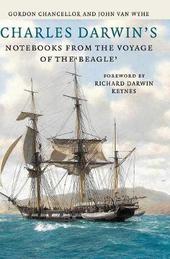
|
Charles Darwin's Notebooks from the Voyage of the Beagle
Hardback
Main Details
| Title |
Charles Darwin's Notebooks from the Voyage of the Beagle
|
| Authors and Contributors |
Edited by Gordon Chancellor
|
|
Edited by John van Wyhe
|
|
Foreword by Richard Darwin Keynes
|
|
Assisted by Kees Rookmaaker
|
| Physical Properties |
| Format:Hardback | | Pages:650 | | Dimensions(mm): Height 246,Width 173 |
|
| Category/Genre | History of science |
|---|
| ISBN/Barcode |
9780521517577
|
| Classifications | Dewey:576.82092 |
|---|
| Audience | | Tertiary Education (US: College) | |
|---|
| Illustrations |
3 Tables, unspecified; 10 Maps; 312 Halftones, unspecified
|
|
Publishing Details |
| Publisher |
Cambridge University Press
|
| Imprint |
Cambridge University Press
|
| Publication Date |
2 July 2009 |
| Publication Country |
United Kingdom
|
Description
This is the first full edition of the notebooks used by Darwin during his epic voyage in the Beagle. It contains transcriptions of all fifteen notebooks, which now survive as some of the most precious documents in the history of science. The notebooks record the entire range of Darwin's interests and activities during the Beagle journey, with observations on geology, zoology, botany, ecology, barometer and thermometer readings, ethnography, anthropology, archaeology and linguistics, along with maps, drawings, financial records, shopping lists, reading notes, essays and personal diary entries. Some of Darwin's critical discoveries and experiences, made famous through his own publications, are recorded in their most immediate form in the notebooks, and published here for the first time. The notebook texts are accompanied by full editorial apparatus and introductions explaining Darwin's actions at each stage, focussing on discoveries that were pivotal to convincing him that life on Earth had evolved.
Author Biography
Gordon Chancellor is currently Business Manager at the UK Data Archive, University of Essex. He was formerly based at the Museums, Libraries and Archives Council, and before that, managed several regional museums in the UK. He graduated in geology from the University of Wales in 1976, and completed his PhD in palaeontology at the University of Aberdeen, with periods of research at the Universities of Uppsala and Texas at Austin. He carried out post-doctoral research at the University of Oxford in the early 1980s, and began work on the initial transcriptions of the notebooks. He has published works on Cretaceous palaeontology as well as several scholarly papers on Darwin and the Beagle, and is now writing introductions to Darwin's geological publications as Associate Editor of Darwin Online. John van Wyhe is an historian of science. He is the founder and Director of Darwin Online (http://darwin-online.org.uk/) - the largest edition of Darwin's publications and manuscripts ever published, and a Bye-Fellow of Christ's College, Cambridge (Darwin's own college). He recently led the restoration of Darwin's rooms at Christ's College. Dr van Wyhe's research has challenged the long-held view that Darwin held back or kept his theory secret for 20 years (Darwin's delay). His books include Charles Darwin's Shorter Publications, 1829-1883, with a foreword by Janet Browne and Jim Secord (Cambridge University Press, 2009), Darwin in Cambridge (Cambridge, Christ's College, 2009) and Darwin (Andre Deutsch, 2008, and National Geographic, 2009).
Reviews'Not until now has it been possible to read in book form the immediate notes that Darwin himself had written in the little field notebooks that he carried with him ... which takes us all the way to what a young man born two hundred years ago once saw when he was for some years very far from home.' Richard Darwin Keynes, editor of Charles Darwin's Beagle Diary (Cambridge University Press) and great-grandson of Darwin 'This is the first time that Darwin's day-to-day notebooks from the Beagle voyage have been published in their entirety and the result is quite simply stunning. ... The result is to render what is often considered to be the least readable of all Darwin's material instantly accessible and engaging for all. ... hardly a page goes by without some gem jumping out and hinting at the scientific giant he would become.' The Times Higher Education Supplement '... impressive ... a meticulously edited piece ... It provides some interesting dimensions about how scientific observation was made two centuries ago ... as an archival source, it could definitely help graduate students in their research related to Darwin.' PaleoAnthropology
|